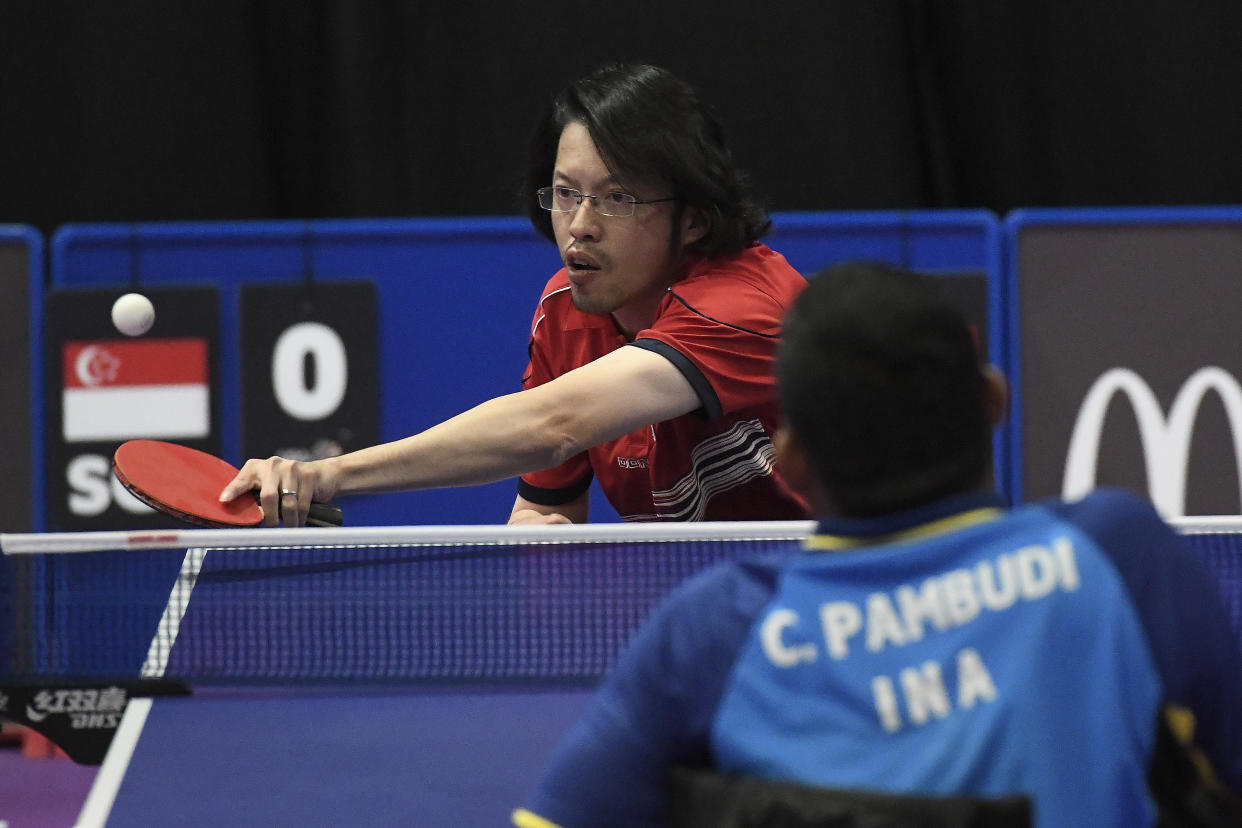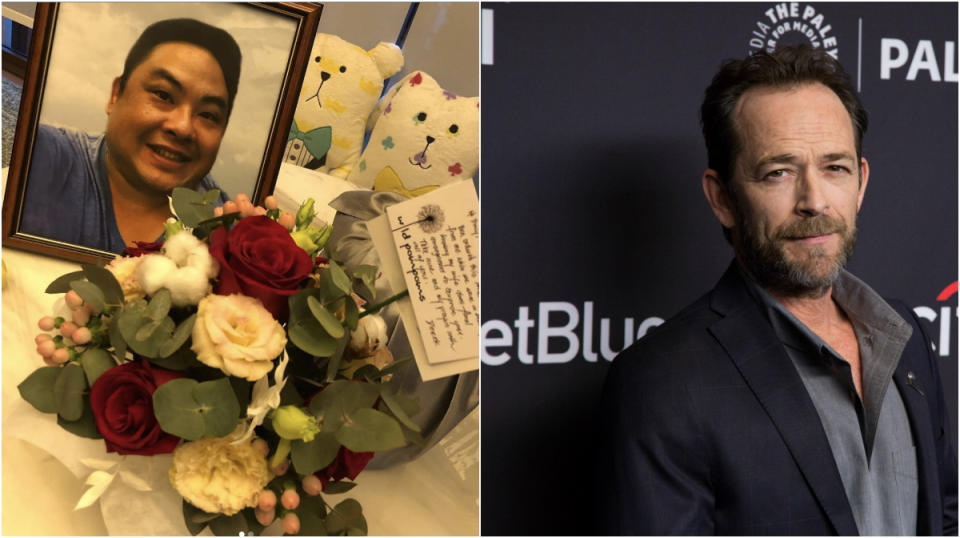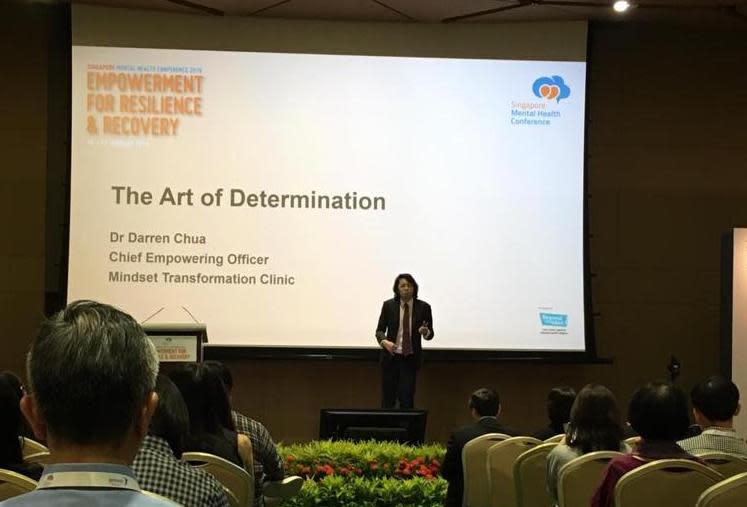Hit by stroke at 24, Singaporean para-athlete and educator turns life around

Darren Chua was home alone playing a computer game during a leisurely afternoon on 28 April 2000.
The 24-year-old medical student was about to start an orthopedic housemanship at the Singapore General Hospital (SGH) in four days.
Out of the blue, Chua experienced total darkness on the right side of his vision.
“At the point of time, I didn’t think I had a stroke even though I was a doctor – most stroke survivors don’t suffer from it so young,” Chua, now 43, told Yahoo News Singapore.
With his parents away on a cruise and a younger sister out with friends, Chua decided to rest on his bed and evaluate the situation. The headaches came as if on cue: intensely, like “someone using a hammer to bash against his head”, he added.
Chua had been born with arteriovenous malformation, a condition that left a blood vessel in his brain weak and not adequately formed.
The fateful turn in Chua’s life happened the moment that the vessel ruptured.
In desperation, he called a friend to come over and accompany him to a clinic. Unfortunately, the friend was stuck in a jam and decided to call for an ambulance to attend to Chua.
With the house keys in hand to open the main door ahead of the paramedics’ arrival, Chua stood up from his bed but fell down almost immediately – his right side had slackened.
It was only then he realised he was suffering from a stroke. His speech started to slur and he could not identify the right key to open the door. He went back to his bed and waited for help to come.
Before his vision faded to complete blackness, he recalled blurry images of paramedics knocking down the door and forcefully entering his place. It was only three weeks later that he regained consciousness.

Two high-profile deaths from stroke
Chua’s experience has shown that stroke – a disease more commonly associated with elderly patients – can strike young and middle-aged adults. The recent deaths of two high-profile personalities – both in their prime – due to stroke have too increased public awareness on the severity of the disease.
Malaysian businessman Ben Goi, the youngest son of “Popiah King” Sam Goi, died at the age of 43 last month after suffering a stroke with a brain haemorrhage. American actor Luke Perry, of hit series Beverly Hills, 90210, died on 4 March after suffering a massive stroke. He was 52.
Latest available statistics have also shown an increase in younger stroke patients in Singapore.
The Singapore Stroke Registry’s 2016 annual report found that stroke patients aged 70 to 79 formed the biggest group before 2012. After 2012, the highest proportion of stroke patients was among those aged 60 to 69.
It also found that the rate of stroke cases among men below 60 years old – in the 30 to 39, 40 to 49, and 50 to 59 age groups – had risen significantly from 2007 to 2016.
In particular, the rate among men aged 30 to 39 who had a stroke almost doubled to 37.3 per 100,000 population over the period. The rate of stroke cases among women rose significantly only for those aged 40 to 49, rising 11 per cent to 57.8 per 100,000 population.
Many young adults have the misconception that they are not susceptible to stroke, said neurology specialist and consultant at Raffles Neuroscience Centre Dr N V Ramani.
“Young people mistakenly believe that they will never get a stroke; that stroke is an illness of old age. Truth is – anyone at any age can get a stroke,” said Dr Ramani. “Even those without these well-known risk factors (eg. hypertension, diabetes, high cholesterol, and smoking) can still have a stroke.”
He added, “Sadly, we are seeing more young stroke patients (in Singapore). Poor diet, lack of exercise and smoking may be among the causes (for adult patients). The youngest (I treated) was seven years old.”
Nearly 57 per cent of young working adults in Singapore believe that they are unlikely to suffer a stroke due to their youth, a recent survey by four fourth-year Nanyang Technological University students found.
The survey, conducted in October and November last year, polled 418 Singapore residents aged between 25 and 34, as part of a final-year project on stroke awareness among young adults.
The findings also showed that over 88 per cent have not assessed their stroke risk in six months, with close to 69 per cent agreeing that they lack access to information on how to perform a self-assessment.
66 per cent were also unable to list any common stroke symptoms, which can include sudden double vision, weak limbs or slurred speech.
“The lack of awareness of stroke symptoms among young adults can lead to delayed medical treatment in hospitals. This could undermine the effectiveness of therapies which are time sensitive,” said Dr Chang Hui Meng, senior consultant from the department of neurology at the National Neuroscience Institute (Singapore General Hospital).
To reduce the risk of stroke, Dr Ramani advised Singaporeans to go for regular check-ups, stop smoking, reduce excessive alcohol intake and have a healthy diet – “low salt, more fruits and vegetables, less red meat and include nuts in your diet”.
“Exercise regularly, at least five times a week, 30 minutes each time. Do it with friends for company and encouragement,” he added.
According to the annual report, there were 7,413 stroke cases admitted to local public hospitals – about 20 per day – in 2016, up from 5,578 in 2007.

Success as table tennis para-athlete
Hours after his collapse, Chua woke up to a shaved head and a “gaping dent” in his brain. He later found out that the doctor who performed his surgery had been his neurology professor.
Surrounded by a medical team of nurses and doctors, – some of whom were faculty mates – he also found out that he could not speak or move his body completely. His vision had remained impaired in his right eye.
“My first emotion was joy because I survived and I am still alive. The subsequent emotions were a lot of stress because I saw all my friends doing the work that I wanted to do,” said Chua.
He was, however, determined to recover. Over the next two to three years of daily rehabilitation, Chua quickly improved – from using a wheelchair to a walking stick and independently without aid. He also gradually recovered his speech capabilities and worked as a healthcare administrator at the SGH in 2004.
Since then, he has completed a two-year Masters in Science at the National University of Singapore and founded Potter’s Clay Education, a tuition centre for primary and secondary school students, in 2009.
Chua, whose right vision is still impaired, started Mindset Transformation Clinic three years later, where he currently conducts motivational talks and team coaching sessions.
Beyond education and public speaking, Chua has even picked up table-tennis.
Joining Team Singapore as a table-tennis para-athlete, Chua won a gold medal in the 2015 ASEAN Para Games along with fellow para-athlete and Singapore Navy serviceman Jason Chee.
He is currently training in hopes of being selected for the 2020 Tokyo Olympic Games.
“Ultimately, your purpose can’t be defined by our career and must be defined by our ability and talents given to us,” said Chua.

More Singapore stories:
Watain Singapore concert ban: IMDA to reach decision ‘soon’ on claim for compensation by organiser
Singaporean man arrested for faking kidnapping in Vietnam for money
Lawyers divided over police statement on past offence of man who drove PM Lee’s son


